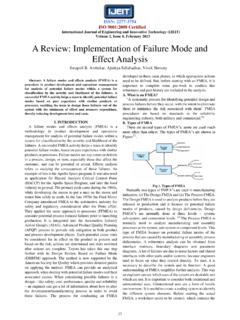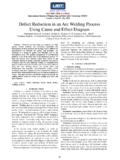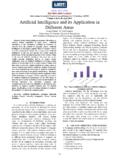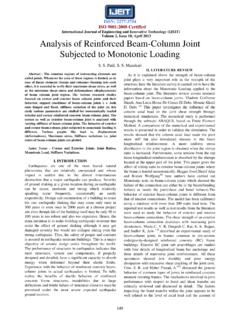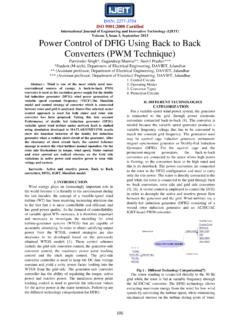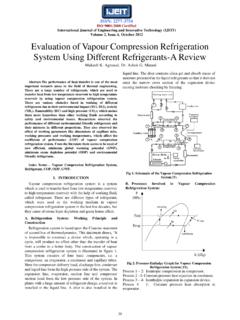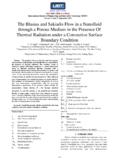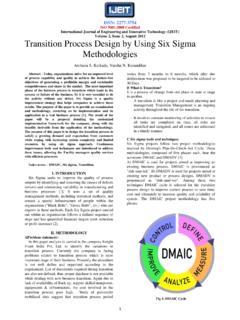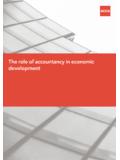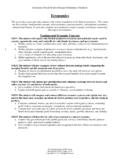Transcription of The Influence of Finance on Performance of Small …
1 ISSN: 2277-3754 ISO 9001:2008 Certified International Journal of Engineering and Innovative Technology (IJEIT) Volume 4, Issue 3, September 2014 161 Abstract The debate, on which Finance affect company Performance , has been a controversial issue in accounting and Finance . This study was undertaken to highlight the issues facing Small and medium enterprises (SMEs) in Iraq in their quest to accessing Finance to undertake various activities; be it general business operations or carrying out expansion project all in the name of fulfilling the objectives as being job creators and helping to reduce poverty. There are financial institutions that are willing to provide funds to Small and medium enterprises (SMEs) but Iraq Small and medium enterprises (SMEs) are not able to meet the requirements of these financial institutions.
2 Chief among these requirements is the issue of collateral, which most Small and medium enterprises (SMEs) cannot provide. This study contributes to the literature on Finance of companies and Performance of Small and medium enterprises (SMEs) by testing the relationship between the Finance and the Performance of Small and medium enterprises (SMEs), and by providing new insights about the need for promoting a truly cognitive entrepreneur. Key words: Finance , Small and medium enterprises (SMEs), Performance . I. INTRODUCTION Small and medium enterprises (SMEs) are very important for employment creation and are important sources of economic growth (Tambunan, 2005). It is therefore not a surprise that Small and medium enterprises (SMEs) receive ample attention in Iraq. Early review indicates that Iraq Small and medium enterprises (SMEs) account for more than 99 per cent of total companies in the country.
3 The evidence suggests that Small and medium enterprises (SMEs) play a vital role in the nation s economy and wellbeing. The largest concentration of Small and medium enterprises (SMEs), in terms of numbers, can be found in the textile and apparel sector, followed by food and beverages, metals and metal products, and wood and wood products (Harash et al. 2013; Harash et al. 2014).The promotion of Small and medium enterprises (SMEs) is regarded as an important issue in many countries, including Iraq (Harash et al. 2013; Harash et al. 2014), because It plays considerable responsibility in providing further employment and conversion of economy. It is also implicit that sectors conquered by Small and medium enterprises (SMEs) are better able to develop dynamic economies of scale (Jasra et al.)
4 2011). The roles of Small and medium enterprises (SMEs) in the creation of productive employment are concerned with its position in the center of the range of sizes and resources intensities in a rising economy. Developing economies have started to focus on the crucial role that Small and medium enterprises (SMEs) can play in their development (Maad, 2008). Due to the importance of Small and medium enterprises (SMEs) in relation to the economic development in a country, studies linked to this field are extremely important to enable researchers and stakeholders to improve their knowledge and expertise in the management of Small and medium enterprises (SMEs) (Harash et al. 2013; Harash et al. 2014). In today's increasingly globalized economy, Small and medium enterprises (SMEs) are usually feeder industries for larger industries and they are crucial for economic growth and development (Kongolo, 2010).
5 Small and medium enterprises (SMEs) are now considered to be the major source of dynamism, innovation and flexibility in emerging and developing countries, as well as to the economies of most nations. They contribute substantially to economic development and employment generation (Koh et al., 2007). Small and medium enterprises (SMEs) form as a potential economic back-bone of many regions and make a large contribution to employment than large companies (Chin et al. 2012). But, although they play a crucial role in economic growth and employment the Small and medium enterprises (SMEs) in developing countries face a financing gap (Beck & Demirguc-Kunt, 2006; Dube, 2013) related to difficulties in Small and medium enterprises (SMEs) access to Finance that undermines economic prosperity Small and medium enterprises (SMEs) are a fundamental part of the economic fabric in developing countries, and they play a crucial role in furthering growth, innovation and prosperity.
6 Finance is probably among the greatest hindrances to Small and medium enterprises (SMEs) in improving financial Performance and competitiveness in Iraq. Consequently, improving a business and implementing policy were essential aspects for Small and medium enterprises (SMEs) development and Finance have been found to be limitation for local and international competitiveness (Beck & Demirguc-Kunt, 2006; Mohd Shariff et al. 2010; Mohd Shariff & Peou, 2008). Unfortunately, they are strongly restricted in accessing the capital that they require to grow and expand, with nearly half of Small and medium enterprises (SMEs) in developing countries rating access to Finance as a major constraint. It has been reported that the main challenges affecting Small and medium enterprises (SMEs) in Iraq include lack of knowledge of Small and medium enterprises (SMEs), access to bank credit (the ranking for Iraq in ease of getting credit was 168 out of 181 countries), access to markets, appropriate The Influence of Finance on Performance of Small and Medium Enterprises (SMES) Emad Harash, Suhail Al-Timimi, Jabbar Alsaadi Madenat Alelem University College, Department of Accounting, College of admin and Economics, University of Basra, Madenat Alelem University College, Department of Accounting ISSN: 2277-3754 ISO 9001.
7 2008 Certified International Journal of Engineering and Innovative Technology (IJEIT) Volume 4, Issue 3, September 2014 162 technology, low production capacity and lack of interest (Harash et al. 2014; Harash et al. 2013; USAID, 2010). The lack of empirical studies on Iraq Finance , particularly on Performance of Small and medium enterprises (SMEs), has been a major constraint ahead of conducting problem-solving studies. Most of the studies involving Small and medium enterprises (SMEs) were merely describing the inadequacies in Finance without providing empirical data (Harash et al. 2013; Harash et al. 2014; USAID, 2010). In summary, the problem statement of the research can be stated as follows: The Challenges faced by Small and medium enterprises (SMEs) in obtaining Finance in Iraq, There are financial institutions that are willing to provide funds to Small and medium enterprises (SMEs) but Iraq Small and medium enterprises (SMEs) are not able to meet the requirements of these financial institutions.
8 Chief among these requirements is the issue of collateral, which most Small and medium enterprises (SMEs) cannot provide. Iraq lacks systematic and empirical researches about the effect of Finance on Performance of Small and medium enterprises (SMEs). The extent that Finance has an impact on Performance of Small and medium enterprises (SMEs) needs to be ascertained to enhance the Performance of Small and medium enterprises (SMEs). Hence, there is a need to determine the relationship between Finance and the Performance of Small and medium enterprises (SMEs). This study will attempt to examine the Influence of Finance variable on the performances of Small and medium enterprises (SMEs). More specifically, this study aims to shed some light on what Finance actually means and investigate the Finance affecting the Performance of Small and medium enterprises (SMEs) in the Iraq.
9 The Contingency Theory developed by Fiedler (1964) was used to support this study. II. Finance Small and medium enterprises (SMEs) are a policy priority for many countries, given their significance in terms of it play a key role in economic development and make an important contribution to employment (Harash et al. 2013; Harash et al. 2014). Financial access is critical for Small and medium enterprises (SMEs) growth and development, and the availability of external Finance is positively associated with productivity and growth. However, access to financial services remains a key constraint to SME growth and development, especially in emerging economies (GFPI, 2011). Finance : Of all the areas in the business environment, improved access to Finance has clear benefits to companies of all sizes (Hallward-Driemeier & Aterido, 2007).
10 One of the principal conclusions of modern economics is that Finance is good for improving Performance (Cecchetti & Kharroubi, 2012) of Small and medium enterprises (SMEs) (Beck & Demirguc-Kunt, 2006; Mohd Shariff et al. 2010; Mohd Shariff & Peou, 2008). The idea that an economy needs intermediation to match borrowers and lenders, channeling resources to their most efficient uses, is fundamental to our thinking (Cecchetti & Kharroubi, 2012). Studies have been to point to evidence supporting the view that financial development is good for improving Performance of Small and medium enterprises (SMEs). More recently, researchers were able to move beyond simple correlations and establish a convincing causal link running from Finance to improving Performance (Cecchetti & Kharroubi, 2012) of Small and medium enterprises (SMEs).
